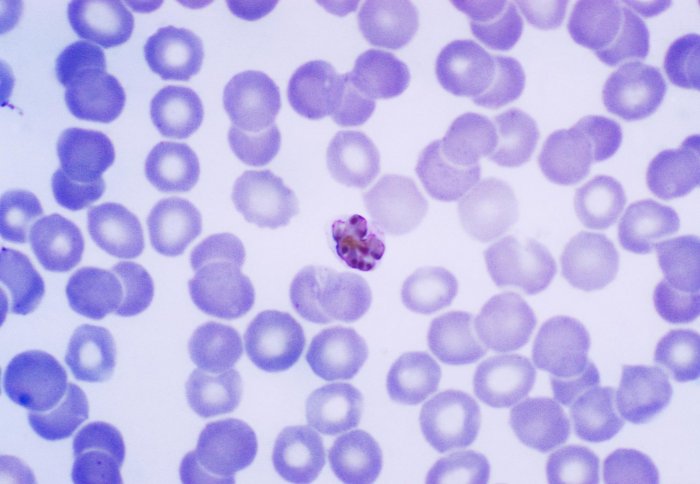
A red blood cell infected with the malaria parasite.

Scientists have taken an important step towards new malaria treatments by identifying a way to stop malaria parasites from multiplying.
In a study published in Nature Chemistry, they show that blocking the activity of an enzyme called NMT in the most common malaria parasite prevents mice from showing symptoms and extends their lifespan. The team are working to design molecules that target NMT more potently, and hope to start clinical trials of potential treatments within four years.
A recent study estimated that 1.2 million people died from malaria in 2010. Although a variety of antimalarial drugs are available, some strains of the parasite are resistant to treatment. These strains are becoming more common, with treatment failures reported across multiple frontline drugs. If acute illness is cured, the parasite can remain dormant in the blood and return to cause illness later. Malaria vaccines have been researched intensively, but none have been introduced into clinical practice.
The drug situation for malaria is becoming very serious.
– Dr Ed Tate
The new study shows that NMT is involved in a wide range of essential processes in the parasite cell, including the production of proteins that enable malaria to be transmitted between humans and mosquitoes, and proteins that enable malaria to cause long-term infection.
The researchers have tested a handful of molecules that block the activity of NMT in the parasite living inside human red blood cells, and in mice, but further refinement will be needed before a treatment is ready to be tested in humans.
Dr Ed Tate, from the Department of Chemistry at Imperial College London, who led the project, said: “The drug situation for malaria is becoming very serious. Resistance is emerging fast and it’s going to be a huge problem in the future.
“Finding an enzyme that can be targeted effectively in malaria can be a big challenge. Here, we’ve shown not only why NMT is essential for a wide range of important processes in the parasite, but also that we can design molecules that stop it from working during infection. It has so many functions that we think blocking it could be effective at preventing long-term disease and transmission, in addition to treating acute malaria. We expect it to work not just on Plasmodium falciparum, the most common malaria parasite, but the other species as well.
“We need to do some more work in the lab to find the best candidate molecule to take into clinical trials, but hopefully we’ll be ready to do that within a few years.”
The discovery is the culmination of a five-year project by a consortium of researchers from Imperial College London, the MRC National Institute for Medical Research, the University of Nottingham, the University of York, and Pfizer, funded by the Medical Research Council, the Engineering and Physical Sciences Research Council, and the Biotechnology and Biological Sciences Research Council.
Reference
M.H. Wright et al. ‘Validation of N-myristoyltransferase as an antimalarial drug target using an integrated chemical biology approach.’ Nature Chemistry, 2013. http://dx.doi.org/10.1038/nchem.1830
Supporters



Article text (excluding photos or graphics) available under an Attribution-NonCommercial-ShareAlike Creative Commons license.
Photos and graphics subject to third party copyright used with permission or © Imperial College London.
Reporter
Sam Wong
School of Professional Development

Contact details
Email: press.office@imperial.ac.uk
Show all stories by this author




Leave a comment
Your comment may be published, displaying your name as you provide it, unless you request otherwise. Your contact details will never be published.